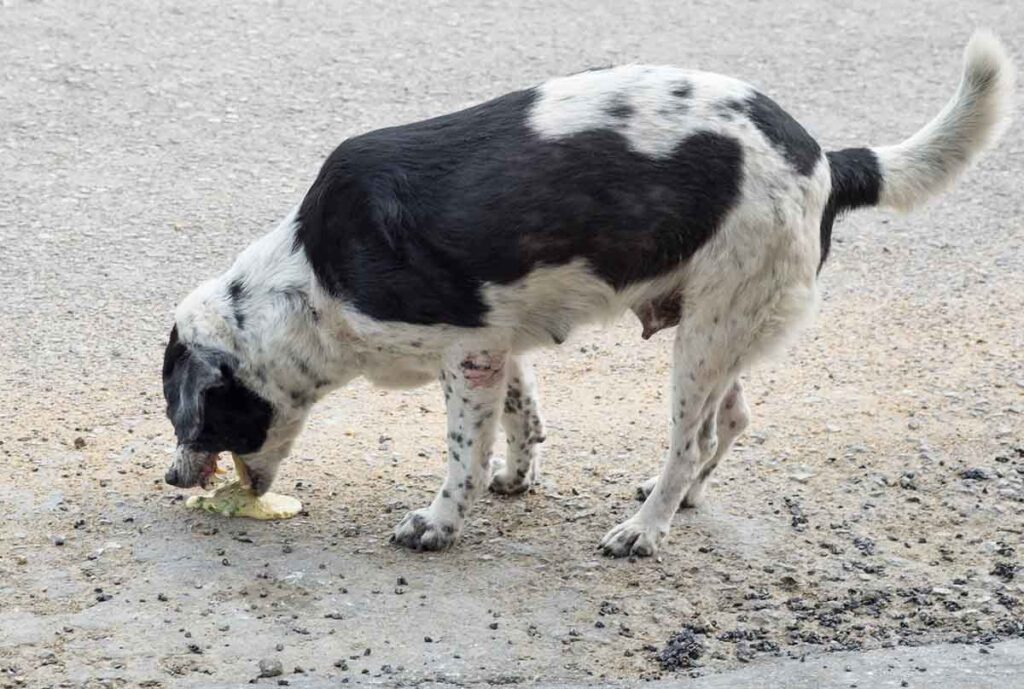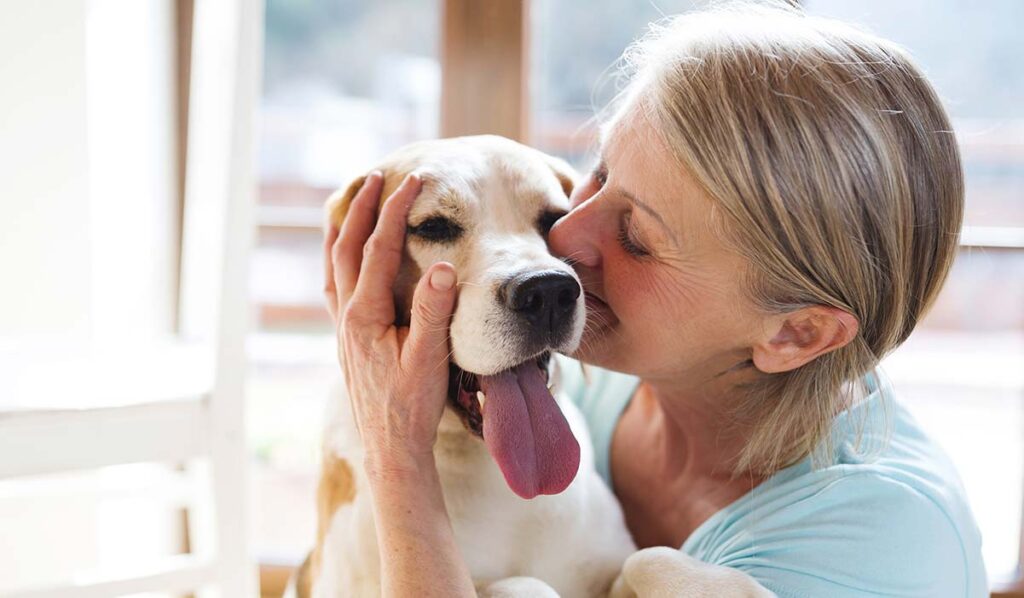
This article was updated on May 1st, 2023

Dogs vomit for all sorts of reasons.
As their loving owners, we naturally become concerned and want to find out why. It could be due to a simple upset tummy or point to a more serious condition or underlying disease that requires immediate veterinarian attention…a frightening thought indeed!
The good news is, vomiting often passes on its own. It is typically short and mild. Medically speaking, when the stomach gets rid of contents via the esophagus and mouth, this is known as “vomitus.” Usually, you will see partially digested food mixed with bile and stomach acid. Once passed, dogs start to feel better almost immediately. But what about dogs who are healthy? Why would a dog be vomiting, yet otherwise acting normal?
Today on Senior Tail Waggers, our canine experts cover the causes, symptoms, and remedies regarding a dog that is acting totally normal yet vomiting.
How Often is Your Dog Throwing Up?
Typically, a dog who throws up will get over it quickly.
So before panicking, first assess the length of time between when your dog first started throwing up but was still acting normal. Dogs who throw up once do not necessarily need to be rushed to the emergency vet. In fact, lots of dogs will get sick if they eat too fast, drink water too quickly, or nibble on something that turns their stomach, like a mouthful of grass.
Make note of what time your dog first threw up. Then, assess the frequency. Between episodes, does your dog seem content? Does he still have a happy-go-lucky attitude? Is he walking around normally? Pay attention to the clock and compare his normal habits to any sickness-related changes in routine.
Most Common Reasons for a Dog to be Acting Normal but Throwing up

When it comes to diagnosing animals, it’s best to take a holistic approach. We need to observe their physical and emotional states to really know what’s going on. This is especially true when it comes to dogs who are ill, but, generally speaking, still seem like their regular old selves.
If your dog is throwing up but still behaving normally, it could be for the following reasons:
1. Eating Too Quickly
Does your dog love to gobble down his food in 10 seconds flat?
While there’s nothing wrong with having a strong appetite, eating too fast can result in vomiting. Why? Well, because with each ferocious bite, air also gets swallowed. The air then expands in the stomach, which, obviously, is uncomfortable for your pup! Likewise, big chunks of kibble can go “down the hatch” before being properly chewed.
The result? Regurgitation. Yuck.
Therefore, owners of healthy dogs (who vomit for no apparent reason) should look into their pooch’s eating habits. For dogs who scarf down their meals, a slow feeder kibble bowl or snuffle mat can be two great ways to prevent fast eating.
The same goes for drinking water, especially after exercise. If your dog seems in a race with themselves to down the water in their bowl, it can lead to vomiting. This is even more likely if your pup just came in from a hard run or play session. Drinking too much too quickly can cause the stomach to reject the water, and anything else it has in it.
2. Medications
Just like for humans, some medications can cause side effects. This includes nausea. A dog who recently began a round of prescriptions could find their tummy reacting to the new dosage. This is particularly true with non-steroidal anti-inflammatory pills that are known to irritate the gut. Many antibiotics have this effect as well. A dog might be acting ordinary right up until mealtime, only to abruptly start vomiting after being fed medication with their food a short while later.
However, this type of nausea is likely to fade and go away quickly. In time, their body should become accustomed to the meds. Speak to your veterinarian if your dog starts vomiting after starting a new medication for some tips on how to help them adjust.
3. Foreign body ingestion
Watch out, puppies!
Being naughty and eating something you shouldn’t have is a leading cause of vomiting. And as all dog parents know, young puppies are very skilled at getting into trouble, especially when there is chewing involved! Stuffing from toys, fabric, furniture, leaves, grass, flowers, rotten food, trash bins, etc., can all bring on a sudden bout of vomiting. When vomit comes out of nowhere, it is the body’s way of trying to expel a foreign object that has become trapped within the gastrointestinal system. This is actually a good thing because once free, it clears up any blockages in the gastrointestinal tract.
Our advice? Keep tempting objects out of reach, firmly close the garbage lid, and supervise your dog any time they’re in a non-dog-proof area. If your dog vomits repeatedly, especially if they have a possibility of foreign body ingestion, you must take them to the vet promptly.
4. Cancer
Cancer in dogs can be deadly. Not because it’s untreatable, but because it is oftentimes difficult to detect. A dog may act perfectly normal until one day, their owner notices strange symptoms becoming more and more common. For example, a tumor of the intestines may block food from passing through. The food then needs another exit. This ends up being your dog’s mouth…AKA vomiting!
Dogs who begin to vomit frequently but show no other signs of illness should be taken for blood tests and ultrasound scans.
Okay, My Dog is Acting Normal, but I’m Still Worried. When Should I Go to the Vet?

Your dog is throwing up and you don’t know why. They are still wagging their tail and smiling that big goofy grin, but as the vomiting continues, you begin to fret. How do you know whether it’s an appropriate time to see a veterinarian? Are you overreacting?
Here are a few factors to weigh in on your decision.
- First, is your dog still eating and drinking water? If your dog refuses food and water, it is likely something is wrong and then yes – go to the vet.
- Secondly, if the vomiting continues for weeks or months, even if it isn’t often, this is a sign that all is not well. And, of course, if the vomiting gets worse, happens more often throughout the day, or contains any questionable materials (such as coins or non-digestible small/sharp objects), then it’s off to the vet you both go!
Once at the clinic, your dog will undergo a full clinical exam. Blood tests, X-rays, and ultrasounds will likely be necessary to get to the root of the vomiting issues.
Tips to Help Your Dog At Home

Before seeing the vet, dog parents can also try some home remedies. Occasional vomiting isn’t always indicative of a more serious health problem. When in doubt, always consult your veterinarian.
But to help at home, you can try these 3 Tips if your old dog throws up:
- Feed bland food: Boiled chicken, rice, scrambled egg, etc., can be given to calm an upset stomach. Read our post featuring 11 Proven Bland Diets for Dogs with an Upset Stomach.
- Withhold food for 12 hours: This gives a dog’s intestinal system a much-needed break and a chance to clear.
- Limit water intake: Dogs require 24/7 access to clean, fresh water. Offer them small amounts at a time.
Final Thoughts
In summary, the next time your dog is throwing up (but acting normal) think about the possible causes. Do they eat fast? Have they started any new medications? Could they have accidentally swallowed something? Keep an eye on how much and frequently the vomiting episodes take place, and watch them closely for other signs that you may have overlooked.
Using these tips, you’ll be able to pass on this valuable information to your veterinarian, should you feel it’s necessary!
Related Articles:
Disclaimer: This website's content is not a substitute for veterinary care. Always consult with your veterinarian for healthcare decisions. Read More.






Thank you for this informative post! It’s reassuring to know that sometimes vomiting can be normal, but I’ll definitely be keeping an eye on my dog just in case. Your tips on when to seek vet help were especially helpful. Fingers crossed it’s nothing serious!
I really appreciated this article! My dog has been vomiting a bit but still seems his usual playful self. It’s such a relief to read that it might not be something serious, but I’ll definitely keep an eye on him and consult the vet if it continues. Thanks for the helpful tips!
Thank you for this informative post! It’s reassuring to know that there could be many reasons for my dog’s vomiting while still acting normally. I’ll definitely monitor him closely and consider reaching out to my vet if it continues. Appreciate the tips!
Thank you for the helpful information! I was really worried when my dog started vomiting but seemed otherwise fine. It’s reassuring to know that it could be something minor. I’ll definitely keep an eye on his behavior and consult the vet if needed.
Thanks for this informative post! It’s reassuring to know that some vomiting episodes can be temporary and that a dog can still act normal. I’ll definitely keep an eye on my pup and look out for any other symptoms.